- Home
- Martin Cruz Smith
Nightwing Page 4
Nightwing Read online
Page 4
“Uncle,” Youngman asked, “what are you up to? What the hell are you doing?”
Abner gazed up at his friend, all eyes and teeth. The skin that wasn’t sliced was punctured by small claw marks. Despite rigor mortis, some of the wounds were still damp.
Sniffing, Youngman recoiled. The same smell as in Joe Momoa’s corral. Around Abner’s body, the serpentine was stained with ammoniac pitch.
Abner’s eyes were dry. Relaxed pupils had folded into slits. Goat eyes.
“I don’t get it, Abner. I don’t know what or why. You don’t want to help me?”
Abner’s teeth, like most reservation Indians’, were thin posts corrupted by decay. The jaw held a stiff grin.
“Okay, uncle.” Youngman closed the eyes.
He wrapped the body in a sheet and carried it to the back of the jeep. He returned to the shed for the photographs. Proper police procedure preserved the site of any suspicious death. For whom and for what, he asked himself. He was about as much police as there was, unless Arizona troopers were called in. For a dead Indian, they’d come in one week, maybe two. It wasn’t a murder. There were animals in the desert. Things happened.
The sand painting was beautiful, complete and beautiful and totally mysterious. From where Youngman had moved Abner, in the middle of the rank stain, was the sprawled negative silhouette of a body.
“Son of a bitch.” Youngman kicked the sand painting. Red grains, blue grains, yellow and white sprayed the walls. When the ground looked like a desecrated work of art, he began kicking the black outline of the silhouette. Ammoniac pitch stuck to his boots. He picked up loose sand and poured it over the outline. The outline faded, but showed through the sand. He looked up. A desert skink was watching him from an orange crate shelf on the wall. Fly wings protruded from the lizard’s jaws. It jumped as Youngman ripped the shelf from the wall. He broke the shelf over his knee, dropped the halves onto the stained floor, and lit a match. And snuffed it between his fingers. Wasn’t going to do any good to burn the place down.
“Dead. Just plain dead.”
As Youngman came out of the shed, he heard the coughing of thunder north from the mesa. A ladder of dark clouds climbed into the sky. Within the clouds, lightning exploded like bombs. A wind scurried ahead of the storm.
The deputy put his jeep in gear and pulled out towards the clouds. A ball of sagebrush bounced by in the opposite direction.
The faces you could see in clouds, Youngman thought. Sad faces with gray and blue cheeks. Puffed up. Eyes closed and ready to cry. Just water, no atomic rain. No end of the world.
“You blew it,” he said to the man in the sheet. “You didn’t end the world, only yourself. A man your age ought to know the difference.”
The thunderheads kept climbing. The hot air of the desert was a wall that the clouds had to scale, until there were two walls, one warm and invisible and the other a cool, boiling blue. The invisible wall retreated, the dark one advanced, casting twenty miles before it an opalescent shadow.
Beneath the feet of the clouds was a washboard road, a clapboard store, an outdoor freezer, and a mud-and-log hogan. Gilboa was the name of the place. It wasn’t a town any more. The U.S. Postal Service no longer delivered mail; the half dozen inhabitants of Gilboa had to go to Shongopovi on the mesa for letters. Maps ignored it, as did the utilities and telephone companies. For that matter, the washboard road vanished at either end about ten miles out, erased by wind and sand.
Fat globules of water rode on the wind. The real storm hadn’t begun yet. Youngman stopped in front of the hogan, picked up Abner in his arms, and went inside. After he laid the dead man out on the floor, he reached up and twisted a hanging light bulb.
The deputy’s office consisted of a rolltop desk and chair. Two-way radio. A metal locker for his gun shells, two bottles of Jim Beam, plastic bag of marijuana, and underwear. Dirt, a lot of dirt because he was away from his office for weeks at a time. Two maps—one of the reservation, another an Arizona State Highway map—were pinned to the wall. They rustled from the breeze Youngman let in to air the hogan out.
He slid up the desk’s ribbed top and took a report form out of one of the pigeonholes. The forms were bought surplus and the rubber-stamped heading “Phoenix Police Department” was crossed out in pencil. He found a leaky ballpoint in another pigeonhole.
NAME—Abner Tasupi. OCCUPATION—garage owner. D.O.B.—unknown, RACE-SEX—Indian male, CRIME—death. Under MODUS OPERANDI, Youngman entered “attack of undetermined animal, possibly rabid.” Then he went out to his jeep.
Dust devils wove back and forth over Gilboa’s road. A hundred yards away and across the road, lightning illuminated Selwyn’s Trading Post. The store was a tombstone of past aspirations. From the clapboard wall a peeling sign promised “Tourist Rooms-Gas-Candy-Dry Goods-Indian Curios.” The tin Coke sign had a broken thermometer. The twin screen doors were patched with electrical tape.
The front of the store carried flour, pinto beans, cheese, blankets and cloth, axe and hoe heads, buck knives and ammo. An eyeless elk was mounted over the counter. Under the counter were pawned jewelry and whiskey in pints. Selwyn was in the rear room with John Franklin and the other whites. An old Hopi woman and four half-breed girls were on the floor, pots and ropes of clay at their feet. Anne was away in her van, searching for firewood before the rain hit.
Selwyn had once been a Quaker missionary. He wore his white hair long, touching the velour shirt which draped open over his gut. A turquoise necklace nestled in the hair of his chest.
“You don’t have to tell me these people need help. Next you’re going to tell me the desert is dry. I know! Excuse me.” Selwyn burped against the back of his hand. “Look, I’ve dedicated my life to these Indians. Speaking absolutely frankly, I personally have poured love and blood over them.”
“That’s very admirable.” Mrs. Franklin launched a smile into Selwyn’s alcoholic haze.
“What do I get in return? A spit in the eye. Look, you folks can hallelujah lizards and get more gratitude. Now I told the Bureau people when they came through a dozen years ago or so, throw your money away on going to the moon. I was willing to testify as an expert. Pardon.” He frowned at a piece of tobacco he picked from his tongue because he couldn’t remember when he’d smoked last. “There wouldn’t be a Gilboa if it wasn’t for me. Did you know that? It’s my generator provides the power here, not just for me but for that freezer they throw their goddamn deer in and for that bum they have for a deputy. You see it? They hate me ’cause I help them. I sell them food on credit. They hate me more for that. And this is the best example of all. These stupid women are making pots. Pots! I mean, every trading post in Navajo country has women in the back making blankets. Now blankets sell, damn it, for $2000, $3000 dollars a rug. My luck, all these savages know how to make is pots. For Christ’s sake,” he rubbed his eyes, “hasn’t anyone got a fag?”
When there was no answer, he opened his eyes and followed his visitors’ gaze to the deputy leaning in the doorway.
“Good.” The trading post owner left the missionaries for Youngman. “You always have a fag.”
Youngman had heard all Selwyn’s complaints many times. The “stupid” women making pots were Selwyn’s wife and daughters.
“Sure.” He tapped out a cigarette for Selwyn. Youngman could see Franklin’s group bracing for a fight. Incredible. Like his store, Selwyn was a wreck in the desert, barely anchored enough in the sand not to roll into an arroyo or whatever else could serve as a gutter. Who would tolerate any white so collapsed except Indians? “There you go.” Youngman held a match to the shaking cigarette.
“Thanks,” Selwyn muttered. “These bible-thumpers they send out now can give hemorrhoids to your ears.”
“That so?”
“Telling me about Indians, for Christ’s sake. Stick around. They’ll get their asses out of here and we’ll have a taste.”
Selwyn’s wife giggled and Franklin cleared his throat because Selwyn’s voic
e had strayed to normal speaking level.
“We’d intended to buy some supplies for our camp-out,” Franklin said. “With our change in schedule, we didn’t have a chance to in Flagstaff.”
“I gotta go,” Youngman told Selwyn. “But I need some cornmeal, rope, a white sack.”
“Who died?”
“Abner.”
“Shit, you don’t say.”
“That was that Indian gentleman we saw this morning?” Franklin asked and was ignored.
“You’re not going to give him a regular funeral, are you?” Selwyn asked Youngman.
“Why not?” Franklin was outraged.
“Because he was a goddamn witch, that’s why!” Selwyn wheeled on Franklin.
“You don’t believe in that, surely.”
“Believe? Brother Franklin, you don’t know where the hell you are, do you? Hey, honey,” Selwyn shouted to his wife, “any witches out here?”
The woman dropped her giggling. She folded her hands on her lap and studied her pots.
“Witches?” Selwyn laughed. “Well, the saints and apostles stop at the reservation line. What do you think this place is fit for? Indians, drunks, bums. Jesus, I was full of ‘thees and thous’ and the Spirit when I came out here forty years ago. Bet I was just as big an asshole as you, Brother. That’s hard to believe, too. Full of the Word, I was. Then one day, I found some of my congregation axing up an old woman. That was something. ‘Why are thee killing this woman?’ I ask. Almost got myself axed trying to stop them. Well, the reason they did her in was because the night before she’d turned herself into a wolf and killed a man.”
“You didn’t believe them.”
“Of course not. I’m not one of these ignorant savages. On the other hand, well, I stay away from haunted pueblos, you know, and when the Indians ax up a witch, which they do every year or so, I keep my mouth shut.” Selwyn paused. “You people keep giving me these pathetic looks. Don’t look at me, look around you. You give yourself some eyestrain trying to see to the end of that sand and you go get yourself lost in those canyons. While you’re there, you ask yourself what kind of gods live in a place like that.”
“We aren’t totally unenlightened persons,” one of the other campers spoke up mildly. “Every society believes in a different Creator. Whatever names they give Him, the Creator is always much the same throughout the world.”
“Yeah? You mean the Skeleton Man.”
“Who?”
“Skeleton Man. Masaw. You call him what you want. Pluto. Satan. I know a man,” Selwyn’s eyes glistened like yellowed china, “thinks this is hell on earth right here. Maybe you’ll come to think so, too.”
“Deputy, if this man we found this morning was a so-called witch,” Franklin said, “is there any possibility that he was killed?”
“Not Abner,” Selwyn answered for Youngman. “He was too big a witch. Sure, they’d chase him off the mesa. But they’d no sooner touch him than cut off their own hands. He’d come right out of the grave for them. Come like a wolf, or a—”
“The man you found,” Youngman interrupted, “was an old hermit. That’s all. Nobody killed him, and if I hear any rumors that someone did I’ll know where those rumors started. Right, Selwyn?” He gripped the store owner above the elbow. “Excuse us, please.”
Youngman pulled Selwyn into the front room.
“You get yourself something to drink, old man.”
“I talk too much when I’m sober.”
“You’re not sober, you’re just not drunk enough. You know better than to start babbling about witches. ‘Come out of his grave . . .’ Jesus.” He found a pint under the counter, unscrewed the top and poured whiskey into Selwyn’s mouth. A gust of wind made the screen doors slap open. Liquor rolled down the side of Selwyn’s chin as he started.
“Just the wind,” Youngman said.
“He could.”
“Then you say yourself a prayer tonight.”
“He could do a lot of things.”
“Not any more.”
Lightning jigsawed over Gilboa. As a bolt hit the outdoor freezer, the inside of the store turned silver, then black from the backflow of electricity. The generator started again. The lights inside the store cast a waxy glow. Youngman hurried to pick up the goods he’d come for.
“Put it on my bill.”
“What else?” Selwyn was feeling better. “Maybe I can still get one of those sob sisters in there to buy a pot.”
Like sails, the clouds split. In half an hour, they’d drop three inches of water, a quarter of the year’s total rainfall, enough to turn arroyos into rapids and break open the armored seeds of smoke trees, ironwood and blue paloverde. Gilboa’s road turned into rutted mud and waves spewed from the jeep’s tires as Youngman drove the hundred yards to his hogan.
A Land Rover was parked in front of the office. He had to run through the mud before putting his shoulder to the door.
Abner was still lying in the corner but the sheet was pulled back and kneeling over the exposed body was another white man.
“You missionaries don’t give up easy.” Youngman shut the door.
The white looked up. He was Youngman’s age, deeply tanned, with close-cut red hair, wide blue eyes, wide smile, dressed in rough khakis and big, so big that the body at his feet looked like a doll. His hands were covered by rubber gloves and, instead of a Bible, they held a scalpel and a glassine envelope.
“Won’t be a minute.” The voice was modestly official.
“You won’t be a second. Stand up.”
Reluctantly, the visitor did as he was told, stooping to prevent his head from touching the ceiling. He rolled the glove off his right hand and held it out to Youngman.
“I apologize for what this must look like. My name’s Hayden Paine.” He held his hand out for ten seconds before dropping it. “Well. Just give me a chance to clean up and I’ll explain everything.”
“If I were you, I’d start talking now.”
Paine smiled, totally at ease despite his bloody gloves, the closeness of the hogan, and the drumming of the rain.
“I’m stopping at all the law enforcement and health offices on the reservation. This will satisfy you, I believe.” He handed Youngman a folded paper. While Youngman read it, Paine crouched by an aluminum case. He removed his second glove and dropped both into a plastic bag, washed his hands with alcohol and cotton, and taped the glassine packet.
“To Whom It May Concern,” Youngman read the letter, “Mr. Hayden Paine is conducting a medical survey that may be of great benefit to our nation. He has full authority to travel the reservation, and to call on the assistance of all officers of the reservation in conjunction with his survey.” The letterhead had an embossed seal of a sun, mountains, and crossed sheaves of corn. It was signed by “Walker Chee, Chairman of the Navajo Tribal Council.”
“I have more identification if you want it.” Paine locked his case.
“I don’t want it. You’re on the wrong reservation.”
“This is Hopi territory, I know, but—”
“You haven’t explained anything yet. You were desecrating a body when I came in and you still haven’t told me why.”
“The medical survey, as explained in—”
“There’s no explanation in die letter. What kind of survey?”
Paine showed no more than a slight social embarrassment. He took the letter back.
“It’s very technical, Sheriff.”
“Deputy.”
“Deputy. I’m doing a serologic study of antibodies. By identifying antibodies in the blood samples of the local population, I’ll be able to identify diseases endemic to this area. Some diseases can’t be found any other way. It’s a complicated process and if I tried to explain it further, I doubt you’d understand. No layman would,” Paine added quickly. “All I can say is that this kind of study is necessary to raise the level of health here. I’ve been having the most trouble getting samples from the older people on the reservation and wh
en I saw the body here I took the opportunity. I meant no discourtesy to the dead man or to you, believe me. If anything, I need your help.”
Paine’s voice had risen to a shout as the drumming of the rain increased in volume, punctuated by kicks of thunder. Paine waited impatiently for the din to fade. Youngman liked the rain; anyone who lived in a desert would. More than that, the downpour forced Paine to be quiet. It forced him to drink his own rain of words. To Indians, words were a white weapon. Indians always found it interesting to watch a white try to be silent. Youngman folded his arms and waited. Silence could be informative.
Paine maintained a broad smile. He was about thirty. His tan was a veneer marred only by a smudge of lost sleep around the eyes. A minute passed under the hard rain.
Paine sighed. He had a big chest and heavy arms, light copper hairs down to the wrists, which were marked by curved scars. A bolt hit outside, probably on the Land Rover, Youngman thought. Paine only glanced aside at the crash. Confident and self-controlled. The storm continued to work to its climax. It wasn’t so much rain that opened desert seeds as violence. Paine’s smile had relaxed to amusement.
The blue eyes were clear as pools, untroubled and unruffled. Totally neutral. There was no pigment in blue eyes, Youngman remembered. It was all refraction. Dead eyes, Abner called them. Used to call them. Paine held the mutual gaze patiently, still amused. Water ran under the floor boards of the hogan. Five more minutes passed while lightning concentrated on the meager elevation of Selwyn’s store.
Selwyn’s generator faltered. The bulb in the hogan dimmed to the power of a cigarette, and at that level slowly pulsed with each feeble beat of the gas-powered generator. Youngman watched Paine’s eyes slide towards the body. Paine’s hands curled into fists and uncurled. The eyes slid back. Youngman saw the blue eyes shadow and the pupils narrow to points. He picked up his rifle. The bulb faded to a single orange filament.
Youngman reached into Paine’s shirt pocket and took out the glassine envelope. Paine’s hand clamped around the deputy’s wrist.

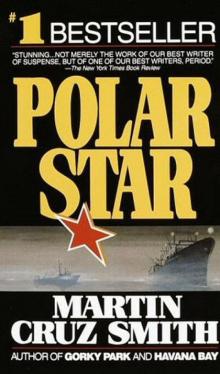 Polar Star
Polar Star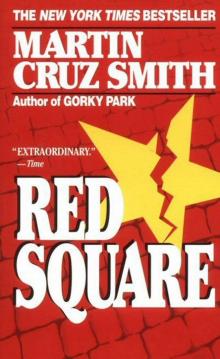 Red Square
Red Square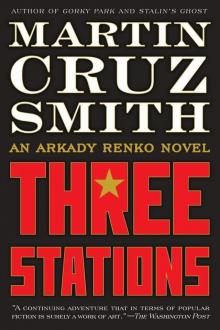 Three Stations
Three Stations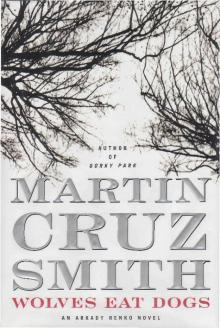 Wolves Eat Dogs
Wolves Eat Dogs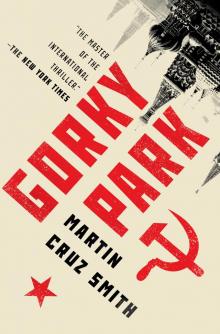 Gorky Park
Gorky Park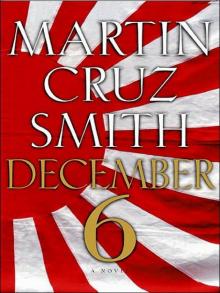 December 6
December 6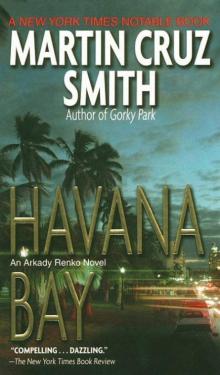 Havana Bay
Havana Bay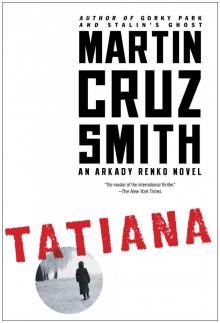 Tatiana
Tatiana The Girl From Venice
The Girl From Venice Stalin's Ghost
Stalin's Ghost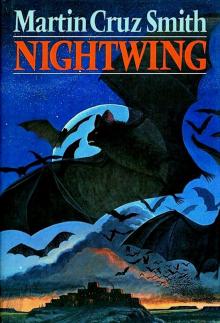 Nightwing
Nightwing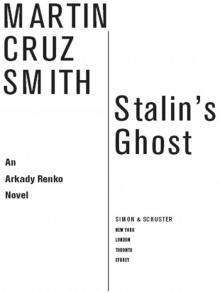 Stalin s Ghost
Stalin s Ghost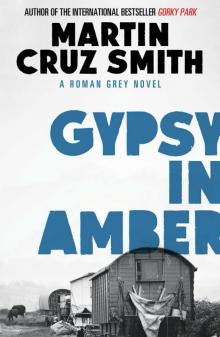 Gypsy in Amber
Gypsy in Amber Rose
Rose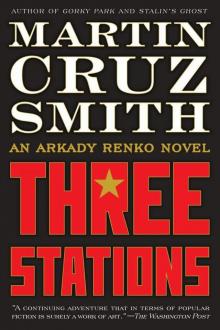 Three Stations: An Arkady Renko Novel
Three Stations: An Arkady Renko Novel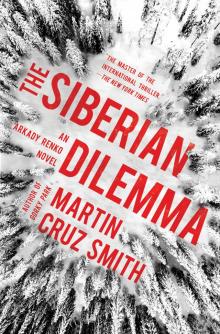 The Siberian Dilemma
The Siberian Dilemma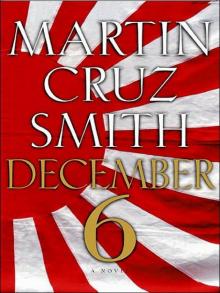 December 6 (V5.0)
December 6 (V5.0)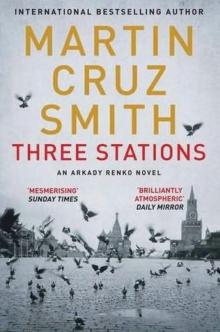 Three Stations ar-7
Three Stations ar-7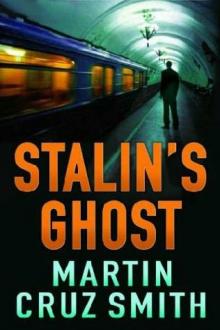 Stalin’s Ghost ar-6
Stalin’s Ghost ar-6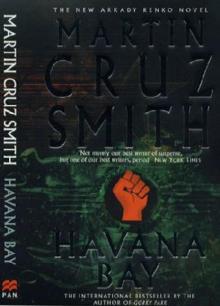 Havana Bay ar-4
Havana Bay ar-4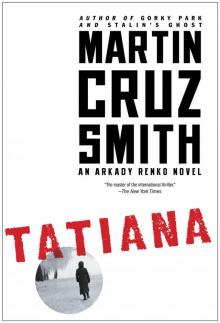 Tatiana ar-8
Tatiana ar-8